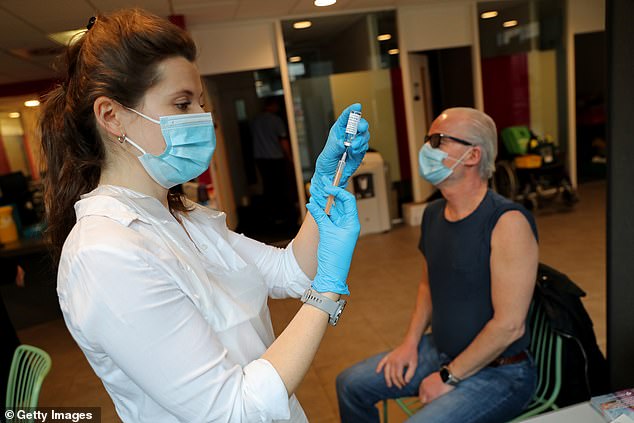Vaccinated people are 30 per cent less likely to pass on Covid after their first dose and less than half as likely to after two doses, a study has suggested.
A study of 300,000 NHS staff in Scotland found it became significantly less likely that someone living with a health worker would test positive if the medic had been immunised.
Scientists are already sure that jabs will prevent severe illness and death but how well they stop the virus spreading is uncertain.
Carried out by Public Health Scotland and the University of Glasgow, the study raises hopes that vaccines could soon spell the end of nationwide outbreaks of the virus.
The findings applied to both the Pfizer and AstraZeneca vaccines and did not look at whether one offered more protection than the other.
And they come after a study yesterday showed the Pfizer/BioNTech vaccine is 94 per cent effective at preventing asymptomatic cases, meaning it may be even better at reducing transmission.
Vaccinated people are 30 per cent less likely to pass on Covid after their first dose and less than half as likely to after two doses, a study by the University of Glasgow and Public Health Scotland has suggested. Pictured: Clinical Pharmacist Ellie Morton prepares to administer the Oxford/AstraZeneca vaccine at Kingston University in London today
The Public Health Scotland-led study assessed the records of people who live with both vaccinated and unvaccinated health care workers, finding those with who had a single dose were at least 30 per cent less likely to pass the virus on.
Around 300,000 NHS workers were assessed on the first day of vaccination in Scotland — December 8 — and again on March 3.
They reached a conservative estimate that the jab was preventing 30 per cent of transmission between the healthcare workers and their households.
But this is likely to be considerably higher because the people at home may have got the virus from elsewhere – from an unvaccinated person in public, for example – but still been included in the group who caught it from the NHS staff.
People who had both doses were at least 54 per cent less likely to pass on the virus, the scientists said.
Dr Dianne Stockton, the Public Health Scotland lead for the Covid-19 Vaccination Surveillance Programme, said the results were ‘encouraging’, but stressed this should not make the public complacent.
She said: ‘Despite this good news, it is important to remember that infection prevention and control practices in healthcare settings remain of paramount importance, as do the mitigations to prevent spread in our daily lives.’
The risk of transmission did not go down to zero after individual healthcare workers were vaccinated, but real-world protection is likely to be even higher than in this study.
An Israeli study published yesterday revealed that the country’s ministry of health believe the jab is preventing 97 per cent of Covid-19 cases.
What’s more, the vaccine was 94 percent effective at preventing asymptomatic cases, meaning it likely stops people getting infected at all, therefore making them unable to pass it on.
Those who were unvaccinated were 44 times more likely to develop symptomatic Covid-19 and 29 times more likely to die from the disease, researchers also found.
The study was conducted using data collected between January 17 and March 6, 2021, when the Pfizer-BioNTech vaccine was the only vaccine available in Israel.
‘This clearly demonstrates the power of the Covid-19 vaccine to fight this virus,’ Yeheskel Levy, director of the health ministry, said in a statement.
‘We aim to achieve even higher uptake in people of all ages, which gives us hope of regaining normal economic and social function in the not-so-distant future.’
Dr Stockton added: ‘As Scotland continues to deliver its national Covid-19 vaccination programme, this study does give one more reason why everyone invited to have a vaccine should take up the offer, as not only will it help protect them from Covid-19, but it will help protect the people close to them.’
Dr David McAllister, of Glasgow University, said: ‘Our study has important implications for informing vaccination strategies.
‘The Joint Committee on Vaccination and Immunisation in the United Kingdom recently commented on the lack of real-world evidence evaluating the role of vaccination programmes on transmission.
‘We provide the first direct evidence that vaccinating individuals working in high-exposure settings reduces the risk to their close contacts – members of their households.
‘Our work will also be of interest to modellers, as it can be used to inform their predictions about future rates of Covid-19 in the community.’
More than 23million people have now had at least one dose of the coronavirus vaccine in England, with the vaccine drive across the UK vital in ensuring lockdowns are eased.
It comes after official figures revealed less than half of care home staff have accepted their Covid vaccine in parts of London — despite working with elderly residents who are most at risk of dying from the disease.
NHS England statistics showed 74.3 per cent of care home staff across the country had received their first dose of the vaccine by March 7.
But the data — which break up the country into 150 areas — shows uptake of the life-saving vaccine among carers and residents varies widely across the nation.
Lambeth in south London has the lowest proportion of care home staff vaccinated, with an uptake rate of just 42.6 per cent. In comparison, seven areas have vaccinated more than 85 per cent, with the Isles of Scilly inoculating all 30 of its care home staff.
All staff in care homes should now have been offered a first dose of the vaccine, with England’s Covid vaccine roll-out officially widened to over-55s this week.
